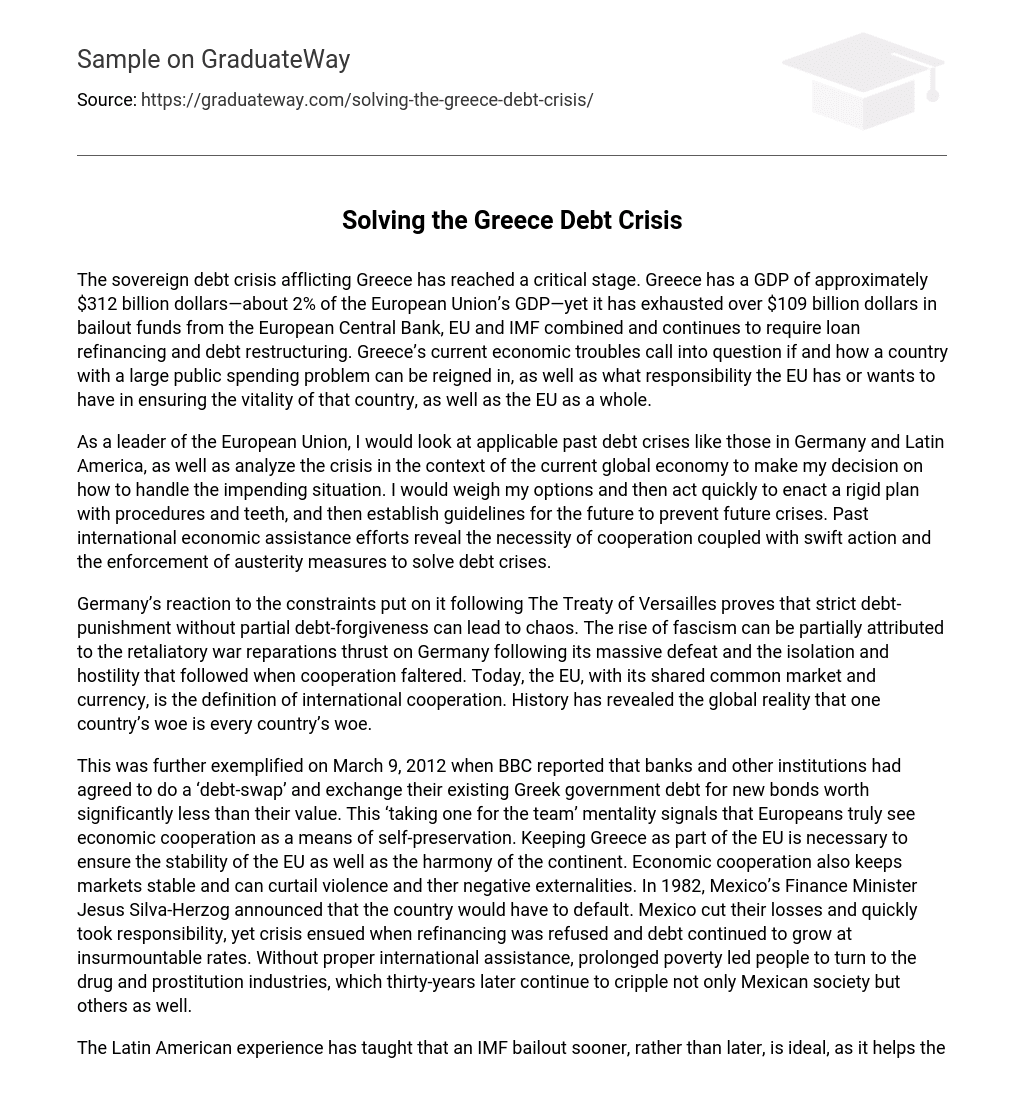The sovereign debt crisis afflicting Greece has reached a critical stage. Greece has a GDP of approximately $312 billion dollars—about 2% of the European Union’s GDP—yet it has exhausted over $109 billion dollars in bailout funds from the European Central Bank, EU and IMF combined and continues to require loan refinancing and debt restructuring. Greece’s current economic troubles call into question if and how a country with a large public spending problem can be reigned in, as well as what responsibility the EU has or wants to have in ensuring the vitality of that country, as well as the EU as a whole.
As a leader of the European Union, I would look at applicable past debt crises like those in Germany and Latin America, as well as analyze the crisis in the context of the current global economy to make my decision on how to handle the impending situation. I would weigh my options and then act quickly to enact a rigid plan with procedures and teeth, and then establish guidelines for the future to prevent future crises. Past international economic assistance efforts reveal the necessity of cooperation coupled with swift action and the enforcement of austerity measures to solve debt crises.
Germany’s reaction to the constraints put on it following The Treaty of Versailles proves that strict debt-punishment without partial debt-forgiveness can lead to chaos. The rise of fascism can be partially attributed to the retaliatory war reparations thrust on Germany following its massive defeat and the isolation and hostility that followed when cooperation faltered. Today, the EU, with its shared common market and currency, is the definition of international cooperation. History has revealed the global reality that one country’s woe is every country’s woe.
This was further exemplified on March 9, 2012 when BBC reported that banks and other institutions had agreed to do a ‘debt-swap’ and exchange their existing Greek government debt for new bonds worth significantly less than their value. This ‘taking one for the team’ mentality signals that Europeans truly see economic cooperation as a means of self-preservation. Keeping Greece as part of the EU is necessary to ensure the stability of the EU as well as the harmony of the continent. Economic cooperation also keeps markets stable and can curtail violence and ther negative externalities. In 1982, Mexico’s Finance Minister Jesus Silva-Herzog announced that the country would have to default. Mexico cut their losses and quickly took responsibility, yet crisis ensued when refinancing was refused and debt continued to grow at insurmountable rates. Without proper international assistance, prolonged poverty led people to turn to the drug and prostitution industries, which thirty-years later continue to cripple not only Mexican society but others as well.
The Latin American experience has taught that an IMF bailout sooner, rather than later, is ideal, as it helps the affected country stay afloat and curtails the effects of long-term poverty. It is also necessary to tie any funds to strict austerity measures to ensure that the money is used properly and that debts are repaid. Although spending cuts may increase poverty in the short run, they are a necessary means of getting the debtor country on track and reducing the deficit. However, these measures cause further stagnation when a specific roadmap to growth is not in place.
Furthermore, rehabilitating an economy cannot come without instilling a new mentality of reducing spending, enacting reform and working hard. Although the EU functions through economic cooperation I would argue that Greece needs internal political cooperation to solve its impending crisis. The crux of the Greece problem has really been a national mentality of entitlement which has resulted in an excess of public spending and has only worsened since Greece’s adoption of the Euro.
State policies created a culture of dependency on public assistance and led to a failure of institutions to adequately facilitate economic growth. Therefore, solving the crisis will require government reform that can only be successful when the country can get behind some degree of austerity and national reform. I support solving a crisis through tying all funds to strict austerity measures in conjunction with a specific and delineated road map for growth. Government reform will likely require the support of the masses which will come when growth and prosperity return to Greece.
A European Union leader tasked with solving the problem should look to a country like South Korea as an example of stimulating growth. South Korea found a comparative advantage in technology and was able to export its goods abroad, driving wealth and bringing prosperity. Greece needs to find its comparative advantage which will increase the output and efficiency of goods and services it can produce at a cost relatively cheap to that of other nations. It should look to industries it is already strong in, including tourism, agriculture and entrepreneurship.
The country’s youth, almost half of whom are unemployed, could particularly benefit from this investment. Winston Churchill said, “Those who don’t learn from history are doomed to repeat it. ” A European Union leader should apply lessons learned from the past as well as cooperation, strict austerity measures with stipulations and solutions for stimulating long-term growth, speed, and investing time and resources in long-term growth, to prompt government reform and prevent the Grecian economy from defaulting and causing an international crisis.
Additionally, the Lisbon Plan, a cohesive EU plan aimed at achieving growth across Europe, must be given some teeth, including better monitoring of EU member state’s debt-to-GDP ratios and more funds tied to education and expansion into high growth industries. This will promote innovation and growth. With deficit reductions in our present and the fear of sovereign debt defaults at our backs, the global community, including Greece, can begin to focus on what will be the next industry driving change and growth.





